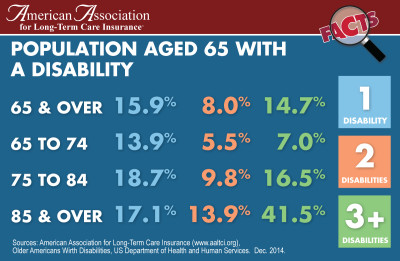A compound that may slow progression of Alzheimer’s disease could have major effects on the LTCI industry
Researchers from the Memory Disorders Program at Georgetown University Medical Center were excited to discover that a highly concentrated form of a compound could slow the progression of Alzheimer’s disease. The compound, resveratrol, can be found in red wine and chocolate as well as grape skins, peanuts, and other plants. Scott Turner, the director of the Memory Disorders Program, cautions that the results from this experiment should not be interpreted to mean consumers should neither increase their intake of red wine and chocolate nor should they begin to take over-the-counter supplements in hopes to slow the progression of or prevent Alzheimer’s disease.
Researchers believe that this compound may have some slowing effects to Alzheimer’s disease because of its ability to trick the body into thinking that the individual taking it is not consuming anything. In individuals who have mild or moderate Alzheimer’s, resveratrol was found to have a measurable impact on an important biomarker of the disease’s advance to those taking daily supplements. When these individuals consumed two grams of this compound per day, the levels of beta amyloid, an abnormal protein, stabilized. The study also shows that resveratrol slowed down metabolism and age-related changes in cells by stimulating enzymes. The regulation of aging would be beneficial to those suffering from Alzheimer’s since aging is the number one risk factor of the disease.
Some participants experienced nausea, diarrhea, and weight loss. Other than this, no signs of serious side effects were experienced by those taking resveratrol daily. To researchers’ surprise, through MRI scans, there was evidence that patients who consumed resveratrol experienced a decline in brain volume. This finding can be explained by reduction of inflammation of the brain that is accompanied by Alzheimer’s. Because of these findings, the next step for this study is to move into Phase 3 trial, which would try to confirm the compounds effectiveness and will allow for researchers to determine how the drug can be used safely.
Today, about 5.4 million people are suffering from Alzheimer’s disease in the United States. This number is predicted to triple by the year 2050. Every 67 seconds someone develops Alzheimer’s in the United States, and in 2050, this will change to someone developing this disease every 33 seconds in the U.S. In addition, 1 in 9 Americans age 65 and older have Alzheimer’s and 1 in 3 ages 85 and older are suffering. Of these millions of Americans, two-thirds of those suffering are women. $226 billion was paid in payments for those with Alzheimer’s in 2015 alone.
According to the American Association for Long-Term Care Insurance (AALTCI), slightly over one in four LCTI claims among nursing homes are the result of Alzheimer’s disease. Alzheimer’s also accounts for the highest average claim payments for nursing homes at about $61,000 as well as the longest length of a claim, which is about 610 days. In general, Alzheimer’s is the leading cause of claim for those ages 65 and up.
Unfortunately, out of the top-10 killers, Alzheimer’s is the only condition that cannot be prevented, cured, or slowed. If researchers were to continue to find success in resveratrol slowing the progression of Alzheimer’s disease in their clinical trials, this study could greatly impact those in the Alzheimer’s community as well as those in the long-term care insurance industry. Not to mention, this discovery could lead researchers in the right direction for finding a cure to this common killer. Thus, if resveratrol were to become accessible to the public to slow the progression of Alzheimer’s disease, this would then dramatically and directly affect the length, amount, and frequency of LTCI claims for those with Alzheimer’s disease.






